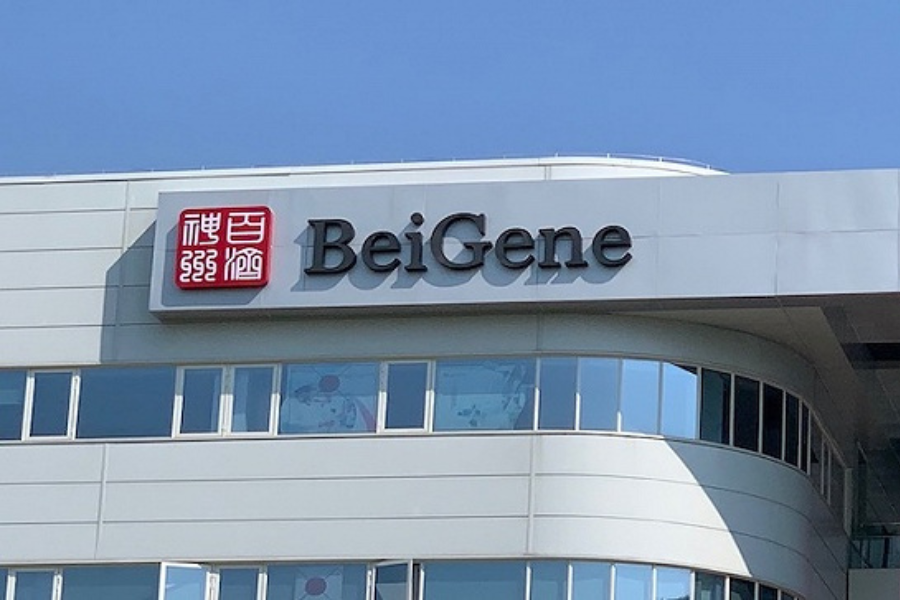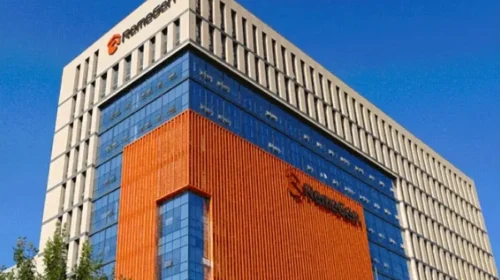Surging Beigene Catches Case of Forex Flu

The drug maker’s net loss grew in the third quarter due to weakness in the Chinese yuan, even as its revenue nearly doubled
Key Takeaways:
- Surging sales for its two self-developed drugs fueled an 88% rise in BeiGene’s third-quarter revenue, but over $100 million in foreign exchange losses caused its net loss to also widen
- At a time when many of its peers are cash starved, the company has plenty of money in its coffers and boosted its R&D spending by 21% during the quarter
By Molly Wen
A strengthening U.S. dollar and weakening Chinese yuan have left cancer drug maker BeiGene Ltd. (BGNE.US; 6160.HK; 688235.SH) suffering from a recent case of forex flu, since its financials are recorded in dollars even though much of its business is in China. The company’s latest financial statement showed its foreign exchange losses exceeded a hefty $100 million in the third quarter alone, setting it further back on its long road to profitability.
Despite a strong performance that saw its revenue rise by 88% during the third quarter year-on-year to $388 million, BeiGene’s loss for the period also grew 27% to $558 million in the three-month period, according to its latest financial results released last Wednesday. The third-quarter loss marked a slight improvement over the second quarter, when the company lost $571 million.
BeiGene raked in revenue of $1.04 billion in the first three quarters of this year, representing a modest year-on-year increase of 9.6%, even as product revenue surged by a much larger 110% to $916 million. But its loss for that period also spiked by 80% to $1.56 billion.
Investors gave the latest report a tepid reaction, with BeiGene’s Hong Kong-listed shares dipping 1.3% the day after the release. But a surge for the broader market last Friday sent BeiGene’s price up by 8% to HK$119.30, its highest level in nearly two months.
The company’s non-operating losses totaled $126 million in the third quarter as a result of its foreign exchange losses. In the third quarter, the Chinese yuan’s foreign exchange rate relative to the dollar dropped by nearly 8%, as the currency trades at some of its weakest levels since 2008.
Drug sales gain momentum
Forex losses aside, BeiGene looked relatively solid on an operating basis. Its big jump in product revenue owed mostly to accelerating sales for its two self-developed drugs, BTK inhibitor Zanubrutinib and PD-1 antibody Tislelizumab. In the first three quarters, drug sales as a share of its total revenue rose from 45% in 2021 to 88%, implying it is no longer overdependent on returns from technology licensing and is maturing as a pharmaceutical company.
Zanubrutinib has now been approved for multiple indications in as many as 58 markets, including the U.S., China, the EU, Britain, Canada, Australia and Switzerland. The drug’s global sales in the third quarter reached $155 million, up 136% year-on-year. Its U.S. sales were particularly notable, more than tripling to $108 million as it gained growing physician acceptance in the market for indications including mantle cell lymphoma and marginal zone lymphoma.
The company previously disclosed in October that Zanubrutinib outperformed Ibrutinib, the most widely used drug in its category, in a comparison clinical trial for the treatment of chronic lymphocytic leukemia (CLL) or small lymphocytic lymphoma (SLL). That means Zanubrutinib will likely be approved in the U.S. to treat of CLL/SLL, further boosting its market potential.
The drug also continues to make headway in its international expansion by entering 10 new markets this year. According to a report by Frost & Sullivan, the global market for BTK inhibitors is expected to reach $20 billion by 2025 and the market in China will grow to 13.1 billion yuan ($1.8 billion).
BeiGene’s other key product, Tislelizumab, posted $128 million in sales in the third quarter, up 67% year-on-year. The drug has been approved for four additional indications since early 2022, helping to boost its market penetration rate. Tislelizumab is also the Chinese-produced PD-1 antibody with the biggest number of approved indications. Its sales are much higher than those for products from the same category, including Sintilimab, developed by Innovent Biologics Inc. (1801.HK), which registered sales of $76.8 million during the third quarter.
Besides its two key self-developed products, BeiGene has signed licensing deals to bring drugs to China developed by multinationals including Amgen (AMGN.US), Bristol Myers Squibb (BMY.US) and Novartis (NVS.US). During the third quarter, it generated $27.5 million by selling products licensed from Amgen, up by 32% year-on-year. But its sales of products licensed from Bristol Myers Squibb declined by 13.8% to $22.4 million.
Flush with cash
Many innovative drug makers are cash-poor these days as they continue to lose money and sentiment toward the group weakens among stock buyers. That has caused names like Clover Biopharmaceuticals (2197.HK), HBM Holdings (2142.HK) and CStone Pharmaceuticals (2616.HK) to announced recent plans to cut back their spending, including layoffs and temporary suspension of drugs in their pipelines.
But despite losing money for most of its life, BeiGene is sitting much prettier, partly due to its raising of substantial funds in the U.S., Shanghai and Hong Kong in three separate IPOs – making it one of the few in its class with shares now traded in all three places. Flush with cash, the company is actually expanding its R&D team, even as its sales and management costs pile up.
By the end of the third quarter in 2022, it was sitting on $5.1 billion in cash, cash equivalents and restricted and short-term investments. That was down 22.7% from the $6.6 billion nine months earlier, but still quite sufficient to meet its spending needs.
The company’s R&D expenses reached $430 million in the third quarter, up 21% year-on-year, mostly due to new hires and growing investment in drug discovery and clinical trials. The company currently has over 40 drug candidates in its pipeline, and previously said it will bring more than 10 new molecular drugs into clinical trials every year covering targeted drugs and immunotherapy cancer drugs starting in 2024.
BeiGene’s strong position has made it the leader in its slice of China’s biotech space. It currently trades at a price-to-sales (P/S) ratio of 14 times, higher than Innovent Biologics, Shanghai Junshi Biosciences (1877.HK; 688180.SH) and CStone Pharmaceuticals, which range from 4 to 10 times. That premium may reflect investor confidence in the company’s prospects as its two core products gain momentum around the world.
To subscribe to Bamboo Works weekly free newsletter, click here






